Posts by Christopher Lochhead
A Call For Unity | Yesterday In Santa Cruz
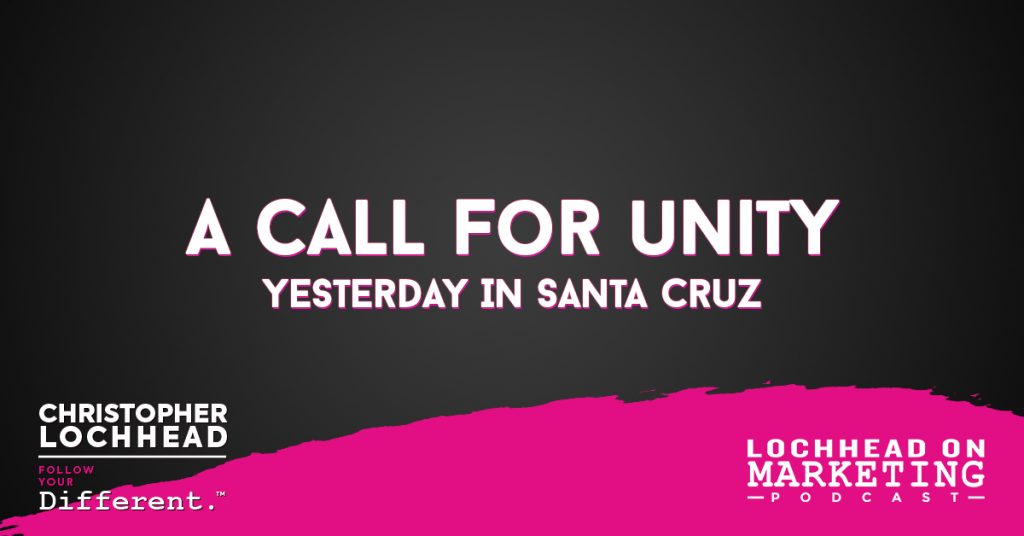
Podcast: Play in new window | Download (Duration: 5:27 — 3.7MB) | Embed
Subscribe: Apple Podcasts | Spotify | Pandora | RSS | More
Monday June 8th, 2020
Yesterday in Santa Cruz, I cried at the vigil for Sargent Damon Gutzwiller, of the Santa Cruz County Sheriff’s department.
He was shot to death on Saturday.
Yesterday in Santa Cruz, I paddled out for George Floyd.
With over 500 people (A paddle out is how surfers mourn).
There have been paddle outs for George Floyd all over the world. Yesterday in the Ocean of Santa Cruz, people of many races screamed “Black Lives Matter”.
Together.
Yesterday the people of Santa Cruz showed that you can stand against evil racism, and stand for good cops.
At the same time.
Because both are the same thing.
Both are stand against violence.
Both are stand against evil.
Yesterday in Santa Cruz, I cried for these two men. And so did countless others. Of virtually every race.
Of all the tears that were cried yesterday in Santa Cruz, every single last one of them, was colorless.
Now, I’d like to share a deeply personal story with you.
A story I have never shared before.
Last year, one of my best friends was brutally murdered, in Santa Cruz.
It will always be unbelievable and unbearable.
A walk-through fire I wish on no one. If you are ever in this situation, you’ll discover how badly you need the cops.
In the moments after I learned what happened,
I was over-come by a Mavericks sized wave of horrible emotions and a profound sense of helplessness.
Which is not a feeling I am used to.
Sometimes, life gives you no choice. You have to grapple with a soul-crushing reality.
You have to accept an absoluteness you cannot change. As this washed over me, I realized something.
I desperately need the cops.
Because, police have the authority and ability to solve heinous crimes in a way that no one else does.
In our case, the agency in charge was the Santa Cruz County Sheriff’s Department. After 231 days, over 3,000 hours of work, by countless professionals, across multiple peacekeeping agencies, in multiple states, the Sheriff’s Department caught them.
The four evil men took my brother’s life.
Now, you should know, he was a “brown guy” (his words).
The four men who killed him are white.
Over the past months, I’ve had a front-row seat to a massive, complex murder investigation.
He’s what I learned.
There are legendary cops.
A lot of them.
The dedicated public servants at the Santa Cruz County Sheriff’s Department, lead by Sheriff Jim Hart, worked tireless to bring this evil to justice.
We saw the sleepless nights the investigators endured.
They fought as hard as I have ever seen anyone fight.
We are forever grateful for the Santa Cruz County Sheriff’s Department.
If I were to name all of the amazing people who worked this case, you’d stop reading this post.
What I’d like you to know is, they cried with us.
They comforted us.
They exhibited extraordinary kindness.
Above all, we got to see peacekeepers with an unending commitment to justice.
I share this with you, because I have experienced the positive power of policing.
I have seen women and men, of every race,
get up every day, put on a bulletproof vest and a badge to risk their lives.
To serve and protect us.
So, the time has come for all of us to demand justice for George Floyd.
To demand equality for African Americans and all people of color.
And to demand real police reform.
It is critical that we remember, that it is possible to demand justice for George Floyd, to demand reform and equality, and support the good cops.
At the same time. There are some in our country who would divide us.
Let us remember there is no us and them.
There is no difference between Black, White, Brown or Blue.
Because evil comes in all colors.
And tears are colorless.
Bless you.
060 10 Commitments Companies Must Make to Advance Racial Justice | Marketing PodStorm 22
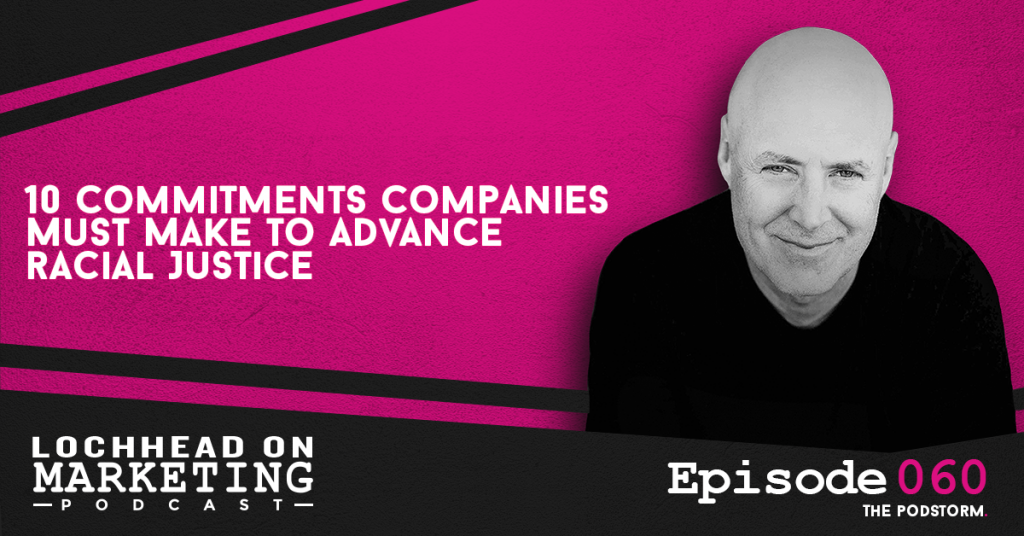
Podcast (lochheadonmarketing): Play in new window | Download (Duration: 14:59 — 10.3MB) | Embed
Subscribe: Apple Podcasts | Spotify | RSS | More
In this episode, let’s take a look at Mark R. Kramers’s article for Harvard Business Review article entitled The 10 commitments companies must make to advance racial justice. Mark is a senior lecturer at Harvard University.
Although Christopher does not agree with Mark’s article in its entirety, he believes these are very powerful ideas worth discussing and advancing inside our companies. Frankly, these commitments should be a must for all business people.
Racial Justice On a Marketing Podcast?
Mark’s list is fascinating and you might be asking why are we discussing this on Lochhead on Marketing. Aside from the fact that its a timely discussion, on a marketing perspective, Christopher believes marketing plays a huge part in creating a culture.
“It’s hard to succeed in the marketplace when you go to market a shitty product. it’s impossible to have legendary internal marketing and communications built on shitty products and policies. Additionally, we are living at a time of mass scrutiny, your category brand and therefore ultimately your revenue will suffer if you’re not viewed as being forward on your skis on topics of race, equality, diversity, and the fair treatment of your people.” – Christopher Lochhead
The 10 Commitments
Christopher discusses each of the commitments and cites Mark’s examples, occasionally adding his thoughts, inputs,and views on these matters.
1. Commit to anti-racism personnel policies and racial-equity training.
Adopt a no-tolerance-for-racism policy like Franklin Templeton’s, which led to its swift, recent termination of Amy Cooper following her altercation with Christian Cooper,
2. Commit to pay equity.
Studies that show closing the racial pay gap would increase U.S. GDP by 14%, or more than $2 trillion.
3. Commit to giving employees a voice.
Ensure representation of hourly employees, women, and people of color in all employment policy decisions. Consider employee representation on your board — it’s a legal requirement in Germany and is one reason why its economy recovered more strongly from the Great Recession than America
4. Commit to supporting full participation in democracy.
“Mark advocates making election day, a paid day off. He’s right. I’m generally no fan of more regulations for business but I’ll go a step further and say, States should mandate election day as a day off, with pay. if an employee wants to vote BEFORE election day, they should be given any day in November off to vote.” – Christopher Lochhead
5. Commit to lobbying for good.
“Mark says, commit at least 50% of your lobbying expenditures to support bills that improve conditions for communities of color I think this is a cool idea and I also think there are a lot of important causes.” – Christopher Lochhead
6. Commit to paying a living wage.
“The national minimum wage hasn’t been raised in a decade and has not nearly kept up with inflation. This has had a disproportionately negative impact on Black workers, Mark points to research that shows States that have raised minimum wages to $15 an hour have seen their economies grow and thrive. Further, he points to Research that shows that the companies that pay well and offer good benefits and treat their hourly employees with respect are more profitable. Walmart raised entry-level worker wages to $12 an hour and saw productivity rise while turnover fell, generating a net increase in corporate earnings.” – Christopher Lochhead
7. Commit to paid parental and sick leave.
“Most women of color cannot afford to take significant periods of unpaid leave from their jobs when they have a child.” – Christopher Lochhead
8. Commit to full health care coverage for all employees and support national health care.
He cites research that shows that Corporations spend twice as much providing employees with health care as they pay in taxes. He argues, that it puts U.S; businesses at a massive global competitive disadvantage, Mark argues, that supporting national health care coverage that would reduce the burden on corporations and ensure that those without insurance — many of them people of color — are covered.
“Here is what I know, tying health care to employment is insane for both employees & employers I know small E entrepreneurs, who’ve been driven out of business because of health care costs and I’ve known many want-trepreneurs, who are afraid to start a company because they can’t afford to lose health care this is mental. it is time to de-couple employment and healthcare.” – Christopher Lochhead
9. Commit to an employee emergency relief fund or low-cost loan program.
Nearly 40% of Americans — disproportionately people of color — lack the savings to cover even a $400 emergency expense.
10. Commit to democratize employment applications.
Eliminate the box for “felony conviction” on job application forms, which disproportionately excludes people of color. Eliminate testing for marijuana use and other drugs if not required by law or the nature of the job. Join the companies such as EY, Google, and Whole Foods that no longer require a college degree for jobs that do not actually need higher education.
Christopher Lochhead’s 11th
“No more stock buybacks. A company that does a stock-buyback is telling the world, they have run out of ideas. A company that does a stock-buyback is telling the world, that they would rather give their cash to executives and investors instead of their people. IMHO stock buybacks are bullshit.” – Christopher Lochhead
To know more about 10 commitments companies must make, download and listen to this episode.
Bio:
Christopher Lochhead is a #1 Apple podcaster and #1 Amazon bestselling co-author of books: Niche Down and Play Bigger.
He has been an advisor to over 50 venture-backed startups; a former three-time Silicon Valley public company CMO and an entrepreneur.
Furthermore, he has been called “one of the best minds in marketing” by The Marketing Journal, a “Human Exclamation Point” by Fast Company, a “quasar” by NBA legend Bill Walton and “off-putting to some” by The Economist.
In addition, he served as a chief marketing officer of software juggernaut Mercury Interactive. Hewlett-Packard acquired the company in 2006, for $4.5 billion.
He also co-founded the marketing consulting firm LOCHHEAD; was the founding CMO of Internet consulting firm Scient, and served as head of marketing at the CRM software firm Vantive.
We hope you enjoyed this episode of Lochhead on Marketing™! Christopher loves hearing from his listeners. Feel free to email him, connect on Facebook, Twitter, Instagram and subscribe on iTunes! You may also subscribe to his newsletter, The Difference, for some amazing content.
059 Questions and Cocktails: FB Live Q & A (Part 6) | Marketing PodStorm 21
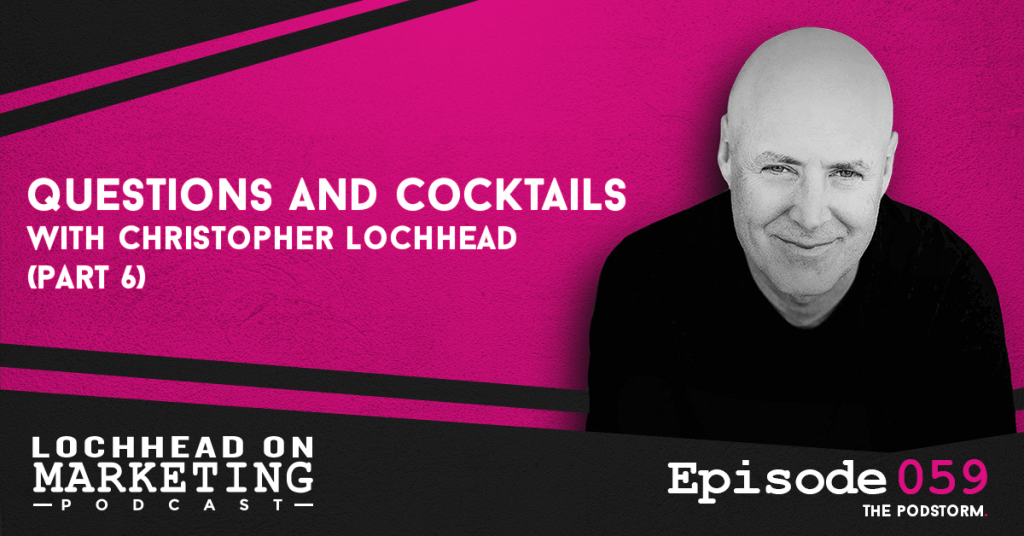
Podcast (lochheadonmarketing): Play in new window | Download (Duration: 24:53 — 17.1MB) | Embed
Subscribe: Apple Podcasts | Spotify | RSS | More
During the PodStorm, we’re doing a live Facebook Question and Answer session, every Friday, 11:30 a.m. PST. This is the sixth part of the series. Today, podcast living legend Jason DeFillippo of Grumpy Old Geeks joins us to answer some questions about the gig economy, key traits of a good marketing professional and staging a lightning strike.Gig economy as displaced creative hubs
The term gig economy has received a lot more negative heat. Christopher says he agrees and disagrees with Jason’s opinions, as he stated in his podcast Grumpy Old Geeks about the gig economy. Jason also gave a few insightful comments about developing a sense of community and cooperation.“We take responsibility for our career. We take responsibility for our financial security, and we decide the kind of work we want to do, with the kind of people want to do it, we decide where the fuck we want to do that.” – Christopher Lochhead
Looking to hire our first marketing person
One listener asked what traits should they look for as they are about to hire their first marketing person. Christopher gave a lot of insights here, basically to avoid “suits” and opt for someone well rounded, preferably from Product Development who could help you with Category Design.“I know you’re going to hate me for saying this, but it’s a well-rounded marketing executive that can put on a scuba suit and can go deep and can put on a wingsuit and fly high. That is to say, air wars and ground wars strategy and tactics. I hate to say this because I didn’t come from this background, but generally, those folks are found more in Product Marketing than in brand, or lead gen, or “corporate marketing,” because they tend to have more of a GM General Manager type mentality.” – Christopher Lochhead
Lightning Strike, Own Event or Hijack An Event?
Should you try to put on your own event planning capitalize on something else in your space, like in a big convention? What are some examples of lightning strike events for small entrepreneurs worth considering? What are other ways to create a lightning strike, especially if your product is a life event product? Christopher answers all of these in this episode.“The other place to look at for things like this, and I don’t normally like to talk about it, because it’s a secret that I don’t like to share, Quora is one of the most under-exploited marketing opportunities out there. Why more thought leaders aren’t on Quora? I don’t understand.” – Christopher LochheadTo hear more about the Facebook Live Q&A with Christopher Lochhead, with Jason DeFillippo, download and listen to this episode.
Bio:
He has been an advisor to over 50 venture-backed startups; a former three-time Silicon Valley public company CMO and an entrepreneur. Furthermore, he has been called “one of the best minds in marketing” by The Marketing Journal, a “Human Exclamation Point” by Fast Company, a “quasar” by NBA legend Bill Walton and “off-putting to some” by The Economist. In addition, he served as a chief marketing officer of software juggernaut Mercury Interactive. Hewlett-Packard acquired the company in 2006, for $4.5 billion. He also co-founded the marketing consulting firm LOCHHEAD; was the founding CMO of Internet consulting firm Scient, and served as head of marketing at the CRM software firm Vantive. We hope you enjoyed this episode of Lochhead on Marketing™! Christopher loves hearing from his listeners. Feel free to email him, connect on Facebook, Twitter, Instagram, and subscribe on iTunes! You may also subscribe to his newsletter, The Difference, for some amazing content.058 Questions and Cocktails: FB Live Q & A (Part 5) | Marketing PodStorm 20
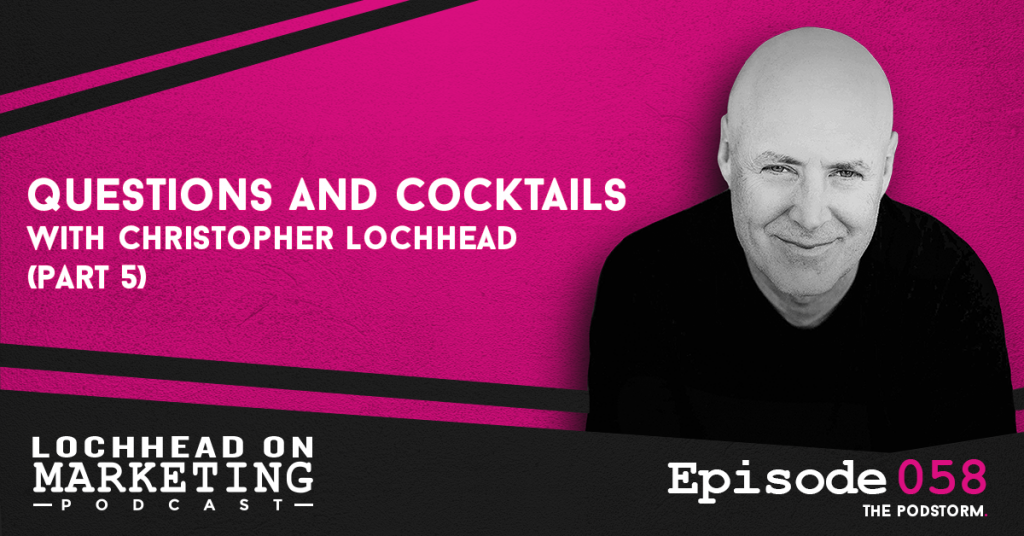
Podcast (lochheadonmarketing): Play in new window | Download (Duration: 22:37 — 15.5MB) | Embed
Subscribe: Apple Podcasts | Spotify | RSS | More
During the PodStorm, we’re doing a live Facebook Question and Answer session, every Friday, 11:30 a.m. PST. We did our first and second one last week. We’re going to share with you our third one in this episode.
Today, podcast living legend Jason DeFillippo of Grumpy Old Geeks joins us to answer some questions about marketing and generating revenue in times of crisis, becoming a CMO who is hard to fire and masterminds for executives of color.
How do brands figure out what to do and say?
Given the current situation of the world, Christopher firmly believes there is no other time than now to make a stand. As he always shares, this is the time to be radically generous and thoughtfully aggressive. He also warns that brands should be prepared to receive a backlash.
“I think for a lot of brands, making a public statement right now is a very smart thing to do.” – Christopher Lochhead
Brands can do a lot of marketing in a positive light while also driving revenue. He encourages brands to take extra caution too with these efforts, as to not sound insensitive or tone-deaf.
“I might feel passionate and want to take a stand or say something or whatever but I am also being more purposely cautious, which is unusual for me. I think it’s a good strategy right now. If you’re going to step into the mix, so to speak, even if you’re trying not necessarily to be controversial, I think it’s a good time to be super thoughtful.” – Christopher Lochhead
What’s your advice for a B2B CMO?
One listener asked for Christopher’s advice, as she is a new CMO in a B2B company. She says she observed most CMOs get fired a lot! Christopher gives out a few pointers to remember, speaking as a 3x CMO himself.
“The first thing is: your entire ability to be effective and successful as a CMO is as a direct result of your relationship with the Chief Executive officer. The second one is one of the main reasons, particularly in the software business, CMOS get fired is they don’t make the cash register sing. The third thing is to make friends with the field.” – Christopher Lochhead
Mastermind Group For People of Color
Another listener asked if Christopher could give reference to a mastermind group for people of color. He fully supports and knows quite a number of African-American entrepreneurs, however he is yet to find a group he could refer to.
To hear more about the Facebook Live Q&A with Christopher Lochhead, with Jason DeFillippo, download and listen to this episode.
Bio:
Christopher Lochhead is a #1 Apple podcaster and #1 Amazon bestselling co-author of books: Niche Down and Play Bigger.
He has been an advisor to over 50 venture-backed startups; a former three-time Silicon Valley public company CMO and an entrepreneur.
Furthermore, he has been called “one of the best minds in marketing” by The Marketing Journal, a “Human Exclamation Point” by Fast Company, a “quasar” by NBA legend Bill Walton and “off-putting to some” by The Economist.
In addition, he served as a chief marketing officer of software juggernaut Mercury Interactive. Hewlett-Packard acquired the company in 2006, for $4.5 billion.
He also co-founded the marketing consulting firm LOCHHEAD; was the founding CMO of Internet consulting firm Scient, and served as head of marketing at the CRM software firm Vantive.
We hope you enjoyed this episode of Lochhead on Marketing™! Christopher loves hearing from his listeners. Feel free to email him, connect on Facebook, Twitter, Instagram, and subscribe on iTunes! You may also subscribe to his newsletter, The Difference, for some amazing content.
057 Why Most Marketing Is Bullshit: 5 Marketing Lies | Marketing PodStorm 19
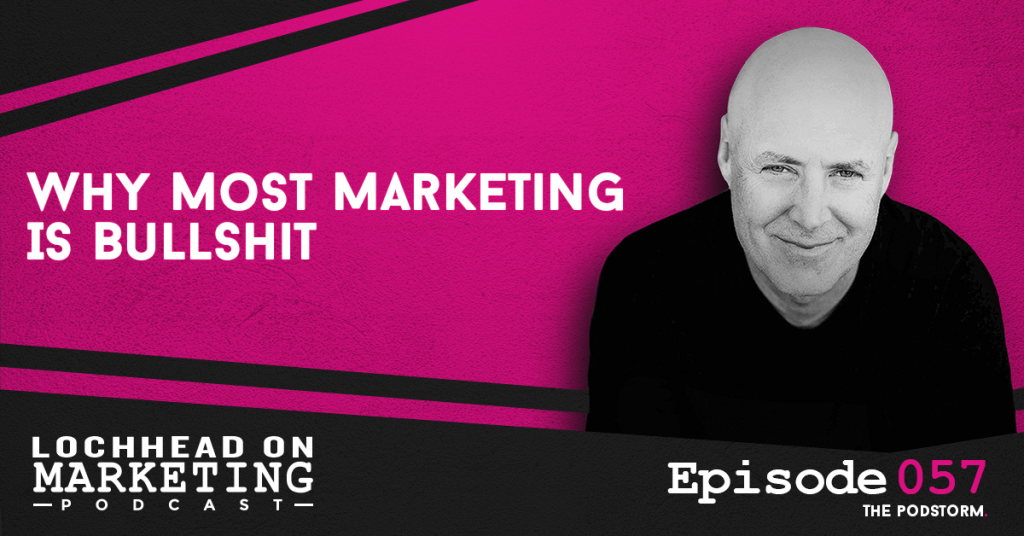
Podcast (lochheadonmarketing): Play in new window | Download (Duration: 10:55 — 7.5MB) | Embed
Subscribe: Apple Podcasts | Spotify | RSS | More
Christopher Lochhead debunks five marketing lies in this episode of Lochhead on Marketing. He talks about why so much of marketing thinking is actually bullshit.
Five Marketing Lies and Why
Number one, great marketing is about marketing into an existing market to increase market share.
“Most legendary innovators, creative creators, entrepreneurs, social change, agents, and so forth, did not play by the rules. They establish their own rules. They designed a new way of thinking As a result, they created new market categories. They did not compete in somebody else’s game by somebody else’s rules.” – Christopher Lochhead
Number two, marketing is about creating demand.
“The legends did not do that. They created demand. There’s a huge distinction between capturing and creating.” – Christopher Lochhead
Number three, success comes from building a brand.
“Category makes the brand not the other way around. Success comes from being the company or the individual that designs a new way of thinking about an opportunity, or a problem that creates a category and your brand is valuable based on the power of the category.” – Christopher Lochhead
Number four, winning is about beating the competition.
“If you’re competing in an existing market, you’re in competition. Winning is not about beating anybody. Winning is about introducing the world to a new way of thinking about a problem and therefore a solution. When the world gets your thinking, bam, you stand alone, you become known for a niche that you own and you stand above everybody else, as opposed to competing with everybody else.” – Christopher Lochhead
And number five, you’re going to win if you have the best product to market.
“As a marketer and an entrepreneur, I would much prefer to have a legendary product and pair that with legendary category design and marketing. That’s what we’re trying to do. Thinking or betting that all you have to do is have a better product. Not so much.” – Christopher Lochhead
To hear more about specific examples on the five marketing lies and why they are BS, download, and listen to this episode.
Bio:
Christopher Lochhead is a #1 Apple podcaster and #1 Amazon bestselling co-author of books: Niche Down and Play Bigger.
He has been an advisor to over 50 venture-backed startups; a former three-time Silicon Valley public company CMO and an entrepreneur.
Furthermore, he has been called “one of the best minds in marketing” by The Marketing Journal, a “Human Exclamation Point” by Fast Company, a “quasar” by NBA legend Bill Walton and “off-putting to some” by The Economist.
In addition, he served as a chief marketing officer of software juggernaut Mercury Interactive. Hewlett-Packard acquired the company in 2006, for $4.5 billion.
He also co-founded the marketing consulting firm LOCHHEAD; was the founding CMO of Internet consulting firm Scient, and served as head of marketing at the CRM software firm Vantive.
We hope you enjoyed this episode of Lochhead on Marketing™! Christopher loves hearing from his listeners. Feel free to email him, connect on Facebook, Twitter, Instagram, and subscribe on iTunes! You may also subscribe to his newsletter, The Difference, for some amazing content.
165 The Gladiator Way w/ American Gladiator Dan “Nitro” Clark
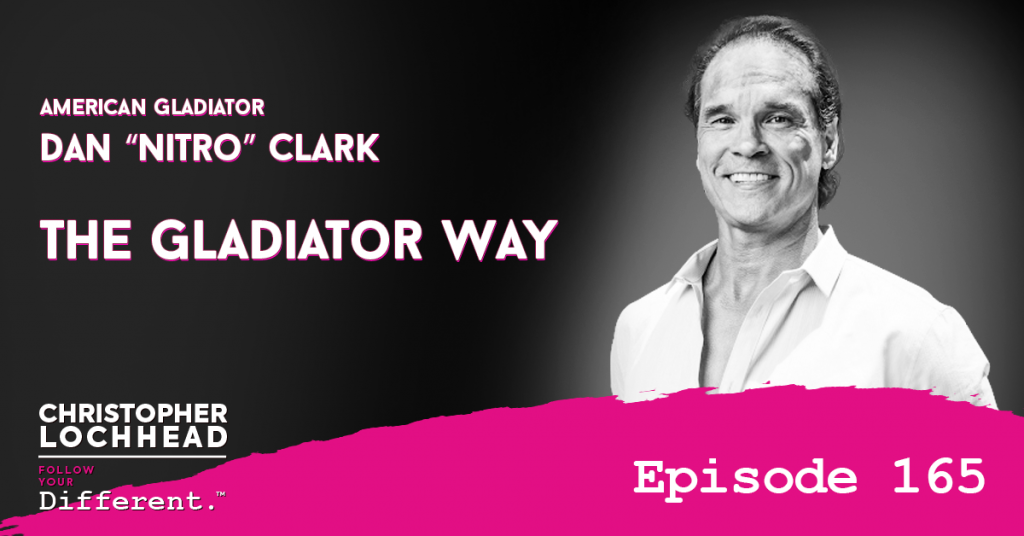
Podcast: Play in new window | Download (Duration: 1:01:55 — 42.5MB) | Embed
Subscribe: Apple Podcasts | Spotify | Pandora | RSS | More
Today, we have a super fun episode with American Gladiator superstar Dan Nitro Clark. He’s a former NFL player, best selling author, speaker, fitness freak, and heart attack survivor. For a big, manly, strong, muscley looking dude with a reputation like his, you might be surprised to hear he is incredibly open, candid, and vulnerable.
We dig into his life as an athlete and a celebrity. He talks about what it’s like to be among some of the earliest athletes in America to take steroids and what he learned from that. We talked about coming back from major setbacks and a whole lot more!
Steroids Use
Dan shares he started using steroids back when he was a freshman College. He wanted to secure a football scholarship badly and he resorted to the “in” thing at that time. Back then, it was unregulated and the only information available about it is that the body recuperates faster.
“I think the fallacy in the misinformation is, anybody who takes steroids is going to get huge. No, you’re not going to get huge. You still got to wait. You got to move waves. It still takes in a tremendous amount of work and effort and diet. Man, you got to go be willing to die, every workout.” – Dan Nitro Clark
The Downside of Steroids
As a strong promoter of steroids use, Dan still warns of the responsibilities one must take before, while and after using steroids. Steroids make the blood clot more so there are indications with regard to medical operations and procedures. It also increases estrogen levels in the body which explains why some men grow “manboobs.”
“It puts you out on a fair playing field. So in that sense, I don’t know if there’s a lot of harm. I think the harm comes when you start to do monstrous levels. With anything excess, and there’s equally when you have low testosterone, there are increased cardiac incidences. All these other side effects, as well and both sides too much too little. The idea is to be in the optimum range.” – Dan Nitro Clark
Wearing The Meatsuit
In a rare moment, Dan shares his personal experiences growing up. Looking back, he shares what he experienced with his divorced parents, the untimely death of his older brother at 12 years old, and how he coped with life as a broken young man.
“I didn’t have anybody to console me. His death my mom was Japanese, she barely spoke the language. So, you know, I learned to take care of myself emotionally. I learned that big boys don’t cry. I learned you don’t talk about your feelings. I learned you sucked it up. I think that was the thing. Nobody can hurt me. Nobody is going to touch me. I think that was the whole idea Why? You know, I wanted to be bigger, stronger, faster. I wanted to have this meat suit on.” – Dan Nitro Clark
To hear more about Dan, the American Gladiator, download and listen to this episode.
Bio:
Dan is a former pro football player, American Gladiator, #1 Bestselling Author, TV Host, Entrepreneur, and Speaker.
He has been featured on Good Morning America, The Early Show, Access Hollywood, Entertainment Tonight, ESPN, EXTRA, People, Time Magazine, Esquire, Men’s Health, Sport’s Illustrated, and the Huffington Post to name a few.
If you’re looking for an extraordinary speaker on the topic of resilience and motivation, you just found him.
Dan is a thought-leader and storyteller with the rare capability to not only inspire your audience to change but also teach them how.
Links:
We hope you enjoyed this episode of Follow Your Different™! Christopher loves hearing from his listeners. Feel free to email him, connect on Facebook, Twitter, Instagram and subscribe on iTunes!
056 Legendary Marketing Copywriting w/ Cole Schafer | Marketing PodStorm 18
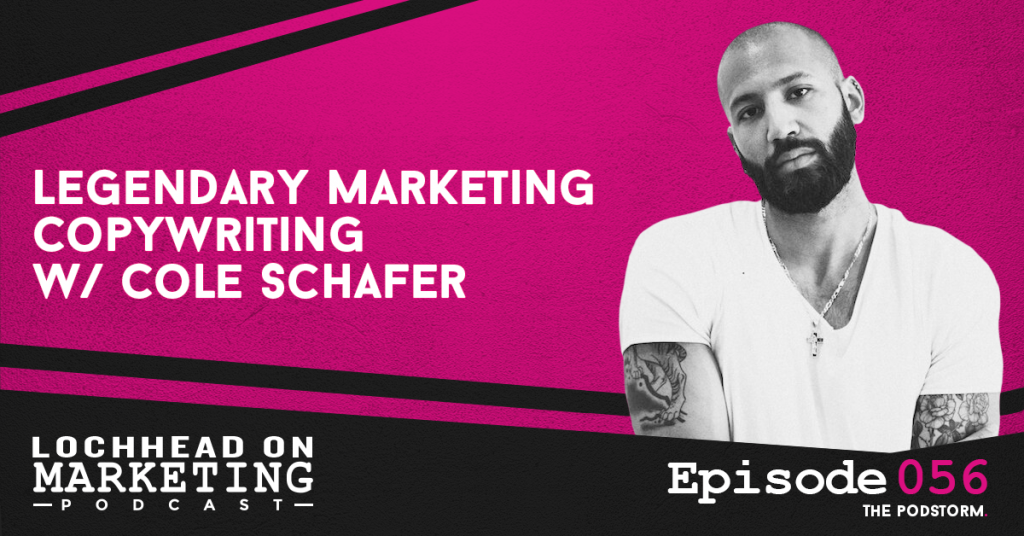
Podcast (lochheadonmarketing): Play in new window | Download (Duration: 24:42 — 17.0MB) | Embed
Subscribe: Apple Podcasts | Spotify | RSS | More
Today, in this very special episode, we’re going to go deep on one of the seminal, most powerful marketing skills there is — copywriting. To discuss more, we have the OG of copywriting, Cole Schaefer of Honeycopy.com. Pay special attention to a particular legendary idea that Cole shares about how you can use your favorite book or books to transform your own writing.
Marketers Should Be Writers
Cole believes all marketers should also be writers. He believes this is of prime importance if you want to reach a wider audience. If more marketers would focus on writing, the messages will be a lot more clear, crisp and ultimately, customers will comprehend messages better.
“The vast majority of business writing and marketing communication, to be honest, it’s just really, really tough to read. I would say primarily because it’s just littered with sort of business jargon and buzzwords. I hate to say but kind of like the showboating is what I feel like when I read a lot of brand writing and it doesn’t feel that it can be understood by the wider audience.” – Cole Schafer
Writing in Third-Person POV
Another observation Cole shares is: brands write on a third-person point of view. Whether it is on their website or other communications, Cole says the rationale behind is the mentality of not being pompous.
“I think for us, any brand, be it big or small, the goal is for when someone sits down and reads their emails or their website, coffee or anything, we really want to feel like we’re talking to another human being. Right?” – Cole Schafer
Become A Legendary Writer
Cole gives out valuable copywriting advice for marketers or even aspiring writers. From knowing your voice and your audience to rewriting ads just like how David Ogilvy does it, Cole gives a rundown on his personal processes.
“I would tell people if whether it’s writing or podcasting or whatever, whatever craft you’re trying to do, just absorb really really, really good art in that specific field. If you want to become a great writer, don’t read bad writing. Pick up a really good book, look up the best writers of all time, start reading there and I think naturally it will imprint on your brain.” – Cole Schafer
To know more about Cole and how to become a legendary copywriter, download and listen to this episode.
Bio:
Cole Schafer likes to live fast, write often, and pet dogs.
He is a thinker, marketer, and writer that has been published in Business Insider, Entrepreneur Magazine, The Mission, Thought Catalog, and P.S. I Love You.
In addition, Cole is the Founder & Copy Chief at Honey Copy, a creative copywriting agency that helps big brands write valuable “stuff” that people actually want to read.
Links:
We hope you enjoyed this episode of Lochhead on Marketing™! Christopher loves hearing from his listeners. Feel free to email him, connect on Facebook, Twitter, Instagram, and subscribe on iTunes! You may also subscribe to his newsletter, The Difference, for some amazing content.
055 How To Fight Injustice w/ Legendary Marketing | Marketing PodStorm 17
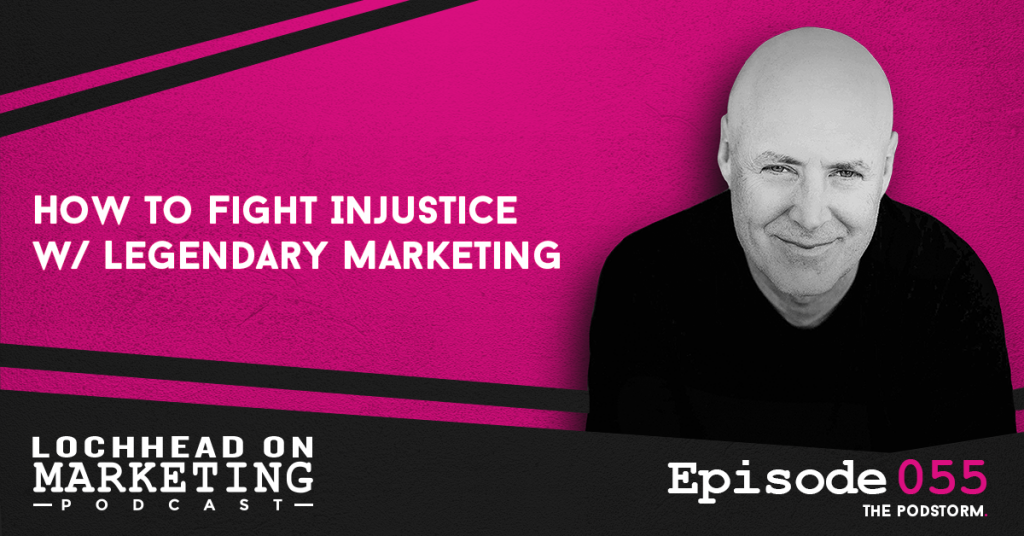
Podcast (lochheadonmarketing): Play in new window | Download (Duration: 14:08 — 9.7MB) | Embed
Subscribe: Apple Podcasts | Spotify | RSS | More
Today, let’s take a look at the role of marketing in driving real, dramatic, impactful, important social change. We dig into topics like the battle against AIDS, the women’s movement, and even the founding of the United States of America as actual acts of legendary marketing, and what you might think of as category design.
It moves the world
Christopher believes that legendary marketing does more than just drive sales. Legendary marketing does more. Marketing a provocative point of view creates a new category of social fabric that drives real societal change
“I would argue to you that the greatest marketers, the most legendary marketers are actually category designers. They introduced the world to new ways of thinking, playing, and working and for major societal change to happen. It requires new categories of thinking, what you might think of as very different points of view, points of view that move the world from the way it is today, to the way we want it to be.” – Christopher Lochhead
More on Societal Change
From spreading awareness about AIDS, to equality wage for equal work, to the establishment of the United States of America, Christopher carefully breaks down why these are provocative points of view that later on demanded societal changes.
He reads several quotes lifted from the actual Declaration of Independence and touches on self-governance, which is timely at the moment of recording, where there is civil unrest in the US because of the untimely death of African American George Floyd.
Designing The World of Your Choosing
As Christopher believes this is a cocoon time, a time in between pre-Covid19 and post Covid19, he poses a question on what kind of world we would like to design?
“So what am I saying to you? Whether it’s a legendary entrepreneur, artist, or social change agent? The question facing all of us in the United States, particularly and frankly, around the world, is what kind of country and what kind of world do we want to design now?” – Christopher Lochhead
Ultimately, for exponential change to happen, it requires category design. It requires the marketing of a point of view that mobilizes a movement to take the world to an exponentially different future. This is why Christopher thinks a real social change requires category design and legendary marketing predicated on a powerful and different point of view.
Bio:
Christopher Lochhead is a #1 Apple podcaster and #1 Amazon bestselling co-author of books: Niche Down and Play Bigger.
He has been an advisor to over 50 venture-backed startups; a former three-time Silicon Valley public company CMO and an entrepreneur.
Furthermore, he has been called “one of the best minds in marketing” by The Marketing Journal, a “Human Exclamation Point” by Fast Company, a “quasar” by NBA legend Bill Walton and “off-putting to some” by The Economist.
In addition, he served as a chief marketing officer of software juggernaut Mercury Interactive. Hewlett-Packard acquired the company in 2006, for $4.5 billion.
He also co-founded the marketing consulting firm LOCHHEAD; was the founding CMO of Internet consulting firm Scient, and served as head of marketing at the CRM software firm Vantive.
Links:
African Americans are incarcerated more than 5 times the rate of white people
From Kenneth Cole, a New Solidarity
We hope you enjoyed this episode of Lochhead on Marketing™! Christopher loves hearing from his listeners. Feel free to email him, connect on Facebook, Twitter, Instagram, and subscribe on iTunes! You may also subscribe to his newsletter, The Difference, for some amazing content.
054 Why You Need A Big Hairy Audacious Goal | Marketing PodStorm 16
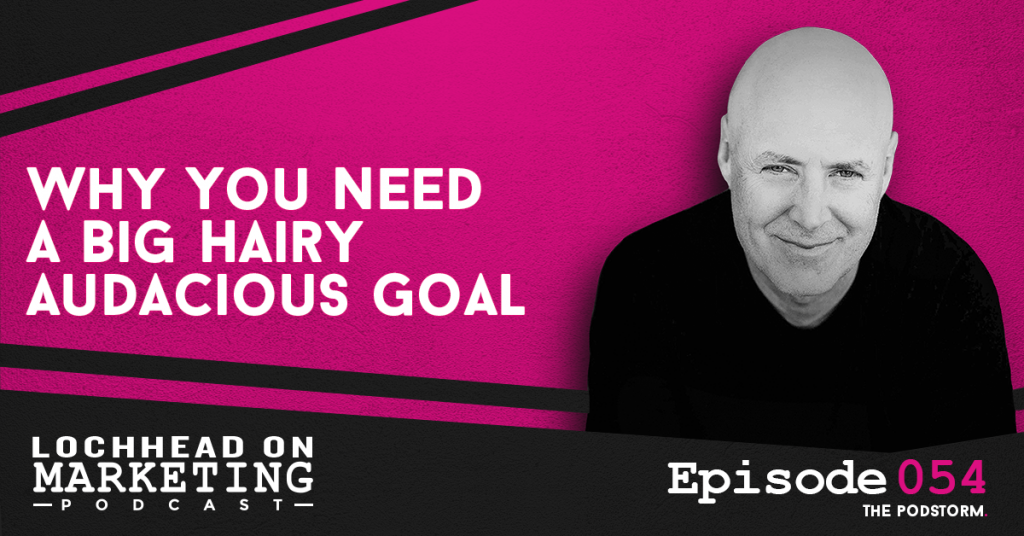
Podcast (lochheadonmarketing): Play in new window | Download (Duration: 9:58 — 6.8MB) | Embed
Subscribe: Apple Podcasts | Spotify | RSS | More
We are hoping you read Jim Collins two legendary books Built to Last and Good to Great. These are game-changers with insanely great research about businesses. In those books, he introduces the concept of a BHAG, which is an acronym for big, hairy, audacious goal. In this episode, let’s talk about why you need, what legendary author Jim Collins calls, a big, hairy, audacious goal.
Man On The Moon Mission
One of the greatest examples of a BHAG is when John F. Kennedy said: USA is going to put a man on the moon within the decade. It is specific, clear, and clearly big and hairy, audacious at the time. Moreover, it is complete since it has time on it.
“Why does this matter in the context of marketing, in particular, in the context of a category design approach for designing and dominating market category? Well, the first part of achieving the goal is to declare it. When you tie a BHAG to a category design strategy, something amazing happens.” – Christopher Lochhead
Microsoft’s BHAG
One of the most powerful examples in the tech industry was Microsoft when they were building the personal computer category. They had a BHAG when they called a computer, a PC on every desktop.
“Number one, PC on every desktop is very clear. Number two, by doing that, Microsoft is declaring themselves the category queen because there’s an interesting thing, in the minds of the market, in the minds of people, the company evangelizing the category must be the leader or category queen or king in that category. Microsoft, in this case, is evangelizing what they want to happen.” – Christopher Lochhead
Are you part of the 10%?
At the beginning of this PodStorm, episode number 39, Christopher shared that approximately 10% of companies get stronger in a downturn. Now, he encourages you to adopt that as a possible goal for your company.
“By declaring your BHAG, and making it clear to your people, your prospects, your customers, your investors, and — this one I actually love the most — your competitors, all of a sudden you’ve planted your flag on something. It becomes very unifying, very focusing. and it motivates your people. Hopefully, it inspires your customers, investors, and partners, and it scares the shit out of your competition. And to me, legendary marketing does all of that.” – Christopher Lochhead
To know more about Christopher and how why you need a BHAG for your company, download and listen to this episode.
Bio:
Christopher Lochhead is a #1 Apple podcaster and #1 Amazon bestselling co-author of books: Niche Down and Play Bigger.
He has been an advisor to over 50 venture-backed startups; a former three-time Silicon Valley public company CMO and an entrepreneur.
Furthermore, he has been called “one of the best minds in marketing” by The Marketing Journal, a “Human Exclamation Point” by Fast Company, a “quasar” by NBA legend Bill Walton and “off-putting to some” by The Economist.
In addition, he served as a chief marketing officer of software juggernaut Mercury Interactive. Hewlett-Packard acquired the company in 2006, for $4.5 billion.
He also co-founded the marketing consulting firm LOCHHEAD; was the founding CMO of Internet consulting firm Scient, and served as head of marketing at the CRM software firm Vantive.
Links:
We hope you enjoyed this episode of Lochhead on Marketing™! Christopher loves hearing from his listeners. Feel free to email him, connect on Facebook, Twitter, Instagram, and subscribe on iTunes! You may also subscribe to his newsletter, The Difference, for some amazing content.

